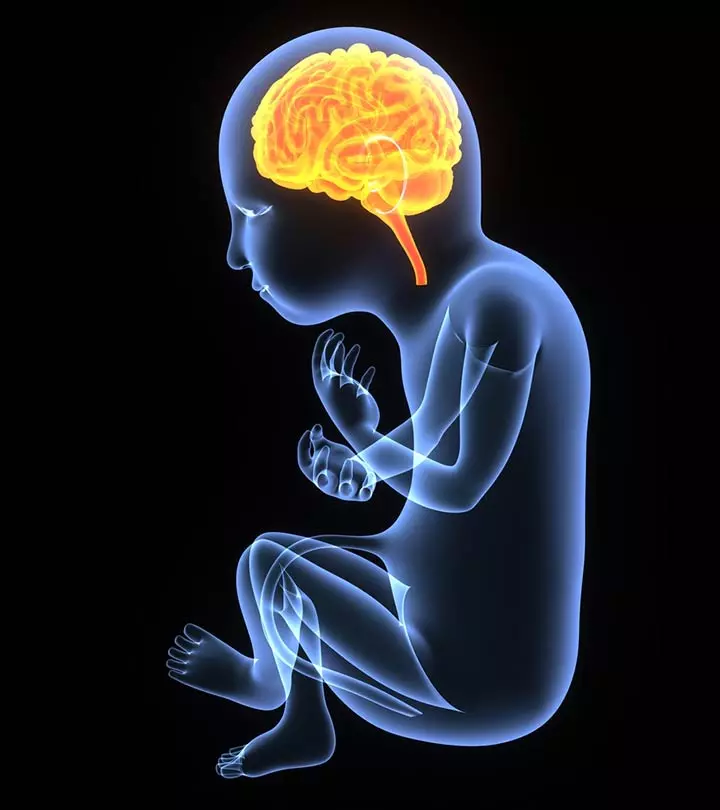

Image: Shutterstock
High blood pressure is rarely associated with babies. This is because the causes of a spike in blood pressure in infants vary from those that are usually seen in adults. The major causes of high blood pressure in babies might include blocked blood vessels in the kidney, a blood clot, or exposure to medicines and narcotics while in the womb.
Read on to know more about the causes of high blood pressure in babies, including its treatment and preventative measures.
What Is High Blood Pressure?
The force that the blood exerts on the walls of arteries when it moves through them is called blood pressure. It is a metric with two numbers, one that indicates the force of blood when the heart is pumping and the other when the heart is at rest (1).
Normal vs. high blood pressure in babies:
Blood pressure (BP) is usually denoted by two numbers written as a fraction, for example, 110/70. The upper number here is called systolic blood pressure, which measures the pressure of the blood when pumped/released by the heart. The lower number is called diastolic pressure, which measures the pressure on the walls of arteries when the heart is at rest.
When the BP is above the desired centile, then it is referred to as high blood pressure. There is no standard blood pressure in babies as normal blood pressure significantly varies depending on several factors such as age, height, weight, and gender of the baby. It also varies based on the activity performed by the child (2).
Medical professionals classify pediatric blood pressure into several grades called percentiles. A normal or high blood pressure is determined by the percentile category in which the baby’s blood pressure falls. Here are some salient points about it (3):
- Systolic and diastolic pressure each are divided into four percentiles: 50th, 90th, 95th, 99th percentile. Each percentile has its prescribed limit of systolic and diastolic blood pressure. The blood pressure of the infant will fall within this range of percentiles.
- A blood pressure between the 50th to 90th percentile is considered normal.
- 90th to 95th percentile is considered pre-hypertension, which means the baby does not have high blood pressure yet but could develop it.
- Blood pressure above the 95th percentile is considered high.
Identifying the cause of high blood pressure helps provide the right treatment.
What Causes High Blood Pressure In Babies?
The following are the most common reasons for high blood pressure among infants (1) (3):
- Heart problems: Problems with the heart, especially congenital heart problems, can cause high blood pressure in infants. A few congenital heart problems that can cause high blood pressure are coarctation of the aorta (narrowing of the large artery called aorta) and patent ductus arteriosus (when an artery between the aorta and pulmonary artery does not close before birth). Some other types of pediatric heart problems can also lead to hypertension in babies.
- Lung conditions: The lungs are the centers where the blood loses carbon dioxide and gains oxygen. Any problem with the lungs can also lead to high blood pressure. Bronchopulmonary dysplasia is one such condition that occurs in babies who are put on oxygen supply right after birth because they were too ill or were born prematurely.
- Kidney disease or complication: Narrowing of blood vessels within the kidney or a blood clot in an artery (renal artery stenosis/ thrombosis) within the kidney can also cause high blood pressure in babies. Babies with congenital kidney problems or a renal infection can develop high blood pressure. Conditions like nephrotic syndrome, and acute and chronic kidney failure are very common causes of hypertension.
- Medicines and exposure to narcotics: Exposure to some medication and narcotic drugs before or after birth can lead to a rise in the blood pressure of the baby.
- Development of tumors: A baby who develops tumors, especially of kidneys, brain or adrenal glands, can be at a higher risk of developing high blood pressure.
- Disorders and infections: Some disorders such as thyroid problems, neurofibromatosis, and tuberous sclerosis increase the risk of high blood pressure. Urinary tract infections may also increase the chances of high blood pressure in babies. Organ transplant and bone marrow transplant may also pose a risk of increasing blood pressure, as a side effect of chemotherapy.
If your baby has any of these conditions, take them to the doctor to check the blood pressure levels.
What Are The Symptoms Of High Blood Pressure In Babies?
Infants with hypertension will not display any notable symptoms. High blood pressure does not cause any symptoms even in older toddlers. Only a doctor can detect it during a routine checkup (4).
How Is High Blood Pressure In Babies Diagnosed?
These diagnostic steps and tools help determine if the baby has hypertension:
- Diagnosing the underlying condition: Your baby’s doctor will test for conditions such as congenital heart problems, renal problems, or other disorders that increase the blood pressure. The doctor can detect high blood pressure while diagnosing other conditions through blood and urine tests.
- Blood pressure check: Pediatricians use the ambulatory blood pressure monitoring (ABPM) for an accurate diagnosis of high blood pressure in babies (5). The ABPM method uses a compact ABPM machine, and a cuff that goes around the upper arm. The cuff attaches to a monitoring device that collects and stores blood pressure data for over a span of 24 hours. Observation of the collected data helps the doctor accurately diagnose high blood pressure in children (6).
- Angiography: Doctors use a specialized form of angiography called digital subtraction angiography (DSA), where the blood vessel is injected with a dye and the patient subjected to X-ray at the same time. The dye makes the blood vessels visible in the X-ray. It gives an accurate image of the blood vessels around the heart and different parts of the body. It helps detect problems in blood vessels that may have led to high blood pressure.
- ECG and MRI: Electrocardiogram (ECG) measures the electrical activity of the heart and converts the data to a graph, which allows cardiologists to check for any anomalies and also the high rate of blood pressure (7). Magnetic resonance imaging or MRI scan provides a detailed image of the body and also detects high blood pressure.
As doctors run tests on a baby immediately after birth, high blood pressure is quite likely to be detected before you leave the hospital with your newborn.
Treating High Blood Pressure In Babies
Treatment depends on what’s causing the high blood pressure. Treatment options for hypertension among infants include:
- Treating the cause of the problem: Doctors aim at treating the problem that led to the high blood pressure in the first place. Addressing the primary cause of hypertension is usually all that is needed to deal with high blood pressure in babies.
- High blood pressure medications: Infants and toddlers seldom need hypertension medications. However, a doctor may consider giving medicines where the root problem cannot be cured immediately, or high blood pressure causes severe damage. Do note that medicines for pediatric high blood pressure are different from those given to adults. Never give the child high blood pressure medications that are meant for adults.
- Dietary modifications: Diet can influence blood pressure in cases of older toddlers. Your doctor will suggest a diet low in salt and sugar for your child. Incorporating more fruits and vegetables is also vital. These changes do not treat high blood pressure overnight, but play a significant role in its management and improvement.
High blood pressure in infants rarely goes unnoticed. But it can cause complications if left untreated for very long.
What Are The Complications Of High Blood Pressure In Babies?
Untreated hypertension in babies eventually causes the following problems:
- Inability to thrive and grow healthily
- Heart failure
- Kidney damage or kidney failure
- Multiple organ failure
- Seizures
You may be able to avoid these by following a few precautions.
How To Prevent High Blood Pressure In Babies?
Prevention of blood pressure in infants is all about dealing with the causes. Here is what parents do to prevent the onset of high blood pressure in babies:
- Stay alert and observant: While blood pressure does not cause any notable symptoms, the underlying causes may. Be vigilant to any such signs early on to manage hypertension in babies better.
- Be regular with doctor checkups: Regular checkups help in early detection of high blood pressure. If you suspect something wrong with the baby, then do not hesitate to tell the doctor about it.
- Maintain a balanced diet: Create a balanced diet for the baby or toddler who has started solids. Provide healthy, home-cooked meals and avoid foods with a lot of salt and fat. Instead, focus on a meal plan that includes all the nutrients in the right quantity. Consult a pediatric dietitian if in doubt to get a customized meal plan for your child.
Next, we answer a few commonly asked questions about high blood pressure in babies.
Frequently Asked Questions
1. Can I measure my baby’s blood pressure at home?
You cannot check the baby’s blood pressure at home, using a household BP apparatus. You need specially designed small-sized BP cuffs for children. Note that you do not have to check the blood pressure every day unless the doctor asks you to keep track of it for some reason.
2. Can I give my baby Baby Aspirin?
No. Babies and toddlers should not be given Aspirin, which is sometimes recommended for adults with controlled high blood pressure and those who are at risk of heart attack (8). The United States Food and Drug Administration states against the use of Aspirin for patients below the age of 19 years (9). Also, Aspirin can cause a liver problem called Reye’s syndrome in children, which can lead to lifelong complications.
High blood pressure in babies could be worrisome for parents as it could indicate certain medical conditions involving major organs such as the heart, lung, and kidney. Moreover, it could be difficult to diagnose as most infants may not have notable symptoms of high blood pressure. Though not common, hypertension is seen in infants and toddlers with an underlying heart or kidney problem. Therefore, it is important to observe any signs of elevated blood pressure in babies and get them evaluated promptly to facilitate early detection and appropriate treatment.
References
1. High blood pressure in infants; U.S. National Library of Medicine
2. Pediatric Vital Signs Normal Ranges; University of Iowa Health Care
3. Diagnosis, Evaluation, and Treatment of High Blood Pressure in Children and Adolescents; National Heart, Lung, and Blood Institute
4. High Blood Pressure in Children and Adolescents; University of Rochester Medical Center
5. E.Grossman; Ambulatory Blood Pressure Monitoring in the Diagnosis and Management of Hypertension; NCBI; Diabetes Care.(2013)
6. Macumber I.; Ambulatory Blood Pressure Monitoring in Children and Adolescents: a Review of Recent Literature and New Guidelines; NCBI (2017)
7. Ashley EA, Niebauer J.; Book: Cardiology Explained.(Chapter 3-Conquering the ECG) ; NCBI(2004)
8. Medicines for high blood pressure; Blood Pressure UK
9. Sarah Macdonald; Aspirin use to be banned in under 16 year olds; NCBI(2002)/
Community Experiences
Join the conversation and become a part of our nurturing community! Share your stories, experiences, and insights to connect with fellow parents.
Read full bio of Dr. Anuradha Bansal
Read full bio of Rohit Garoo














